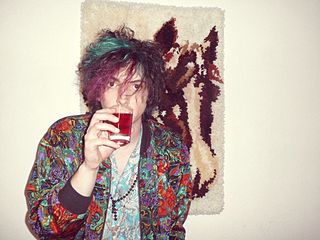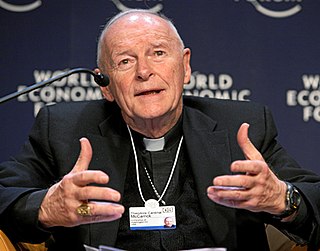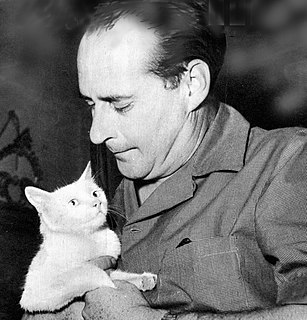A Quote by John Barth
The Genie declared that in his time and place there were scientists of the passions who maintained that language itself, on the one hand, originated in 'infantile pregenital erotic exuberance, polymorphously perverse,' and that conscious attention, on the other, was a 'libidinal hypercathexis' - by which magic phrases they seemed to mean that writing and reading, or telling and listening, were literally ways of making love.
Related Quotes
Dean Burk, PhD, of the National Cancer Institute (head of their Cytochemistry Section and 32-year veteran at the agency) declared in a (May 30,1972) letter to (congressman Louis Frey, Jr.) that high officials of the FDA, AMA and ACS (American Cancer Society), were deliberately falsifying information, literally lying...and in other ways thwarting potential cancer cures to which they were opposed.
When we just saw that man, I think it was Mr. Myers, talking about how great scientists were, I was thinking to myself the last time any of my relatives saw scientists telling them what to do they were telling them to go to the showers to get gassed. That was horrifying beyond words, and that's where science - in my opinion, this is just an opinion - that's where science leads you.
THE WRITER can get free of his writing only by using it, that is, by reading oneself. As if the aim of writing were to use what is already written as a launching pad for reading the writing to come. Moreover, what he has written is read in the process, hence constantly modified by his reading. The book is an unbearable totality. I write against a background of facets.
They were still in the happier stage of love. They were full of brave illusions about each other, tremendous illusions, so that the communion of self with self seemed to be on a plane where no other human relations mattered. They both seemed to have arrived there with an extraordinary innocence as though a series of pure accidents had driven them together, so many accidents that at last they were forced to conclude that they were for each other. They had arrived with clean hands, or so it seemed, after no traffic with the merely curious and clandestine.
That might work," I said. "I'm good at faking it." This led to a couple moments of uncomfortable silence from both of us. "You didn't mean... ?" Morelli asked. "No. Of course not." "Never?" "Maybe once." His eyes narrowed. "Once?" "It's all that comes to mind. It was the time we were late for your Uncle Spud's birthday party." "I remember that. That was great. You're telling me you faked it?" "We were late! I couldn't concentrate. It seemed like the best way to go.
I wish I had time to do more reading, but I just haven't had much time. But I still find time for writing. I've always preferred writing over reading, even though those things do go hand in hand. But when I do have time, even if it's not writing music, just writing in general - ideas and stories and things like that.
If it were not for the Eucharist, if it were not for this marvelous manifestation of God's love, if it were not for this opportunity to place ourselves in the very real presence of God, if it were not for the sacrament that reminds us of His love, His suffering and His triumph, which indeed perpetuates for us His saving sacrifice on the cross, I am sure that I could never face the challenges of my life, my own weakness and sinfulness and my own need to reach out to the Living God.
Ever since ROME, OPEN CITY, I have maintained a conscious, determined endeavor to try to understand the world in which I live, in a spirit of humility and respect for the facts and for history. What as the meaning of ROME, OPEN CITY? We were emerging from the tragedy of the war. We had all taken part in it, for we were all its victims. I sought only to picture the essence of things. I had absolutely no interest in telling a romanticized tale along the usual lives of film drama. The actual facts were each more dramatic than any screen cliche.
The telling of stories, like singing and praying, would seem to be an almost ceremonial act, an ancient and necessary mode of speech that tends the earthly rootedness of human language. For narrated events always happen somewhere. And for an oral culture, that location is never merely incidental to those occurrences. The events belong, as it were, to the place, and to tell the story of those events is to let the place itself speak through the telling.
The therapist can interpret, advise, provide the emotional acceptance and support that nurtures personal growth, and above all, he can listen. I do not mean that he can simply hear the other, but that he will listen actively and purposefully, responding with the instrument of his trade, that is, with the personal vulnerability of his own trembling self. This listening is that which will facilitate the patient's telling of his tale, the telling that can set him free. (5)
I like California because it still has the glamour and romanticism and exoticism of a very foreign place. It was the place that when I was young, I was raised on "I Love Lucy" and listening to the Grateful Dead and reading Jack Kerouac. They, to me, were all symbols of this very foreign sense of promise and movement. After all this time here I'm glad I still have it.
When I taught at the University of Houston in the Creative Writing program we required the poets to take workshops in fiction writing and we required the fiction writers to take workshops in poetry. And the reason for that is because the fiction writers seemed to need to learn how to pay greater attention to language itself, to the way that language works.






































